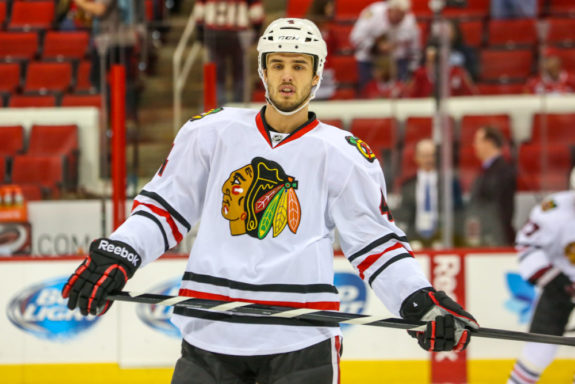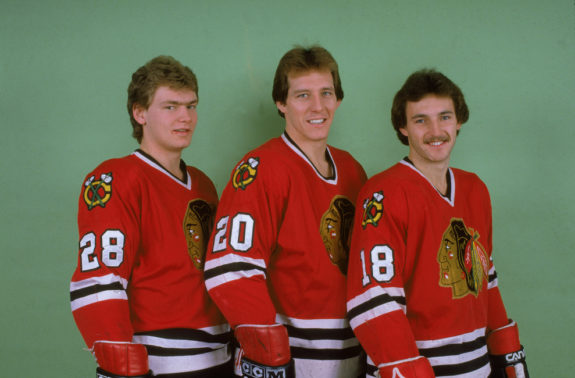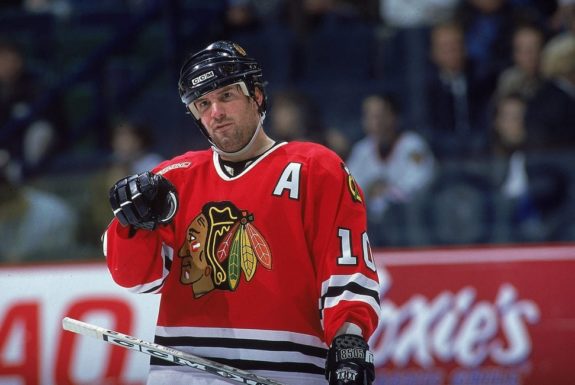When it comes to the trading history of the Chicago Blackhawks, one word that can describe it is memorable. There have been many transactions that have altered the state of the franchise through its worst trades and its best trades. Here is a look at some of the great moves that the Hawks have made; in no particular order.
5. Antoine Vermette
For all the criticism that has been sent to the current general manager, Stan Bowman’s, way, this is the one move that I believe remains one the team’s best from a more recent perspective. When the Blackhawks acquired Antoine Vermette from the Arizona Coyotes on Feb. 28, 2015, it was a rental depth move that helped solidify their 2015 Stanley Cup-winning team.
Related: Blackhawks’ Worst Trades of All-Time
As a center, he won 58% of his faceoffs during the playoffs and was also a plus-four during that time. Vermette was a big reason why the team won the championship that year in the sense that he had three game-winning goals during the playoffs. (from ‘With Game-Winning Goals, Antoine Vermette Is Giving the Blackhawks a Lift,’ New York Times, 06/14/2015) It was a great pickup from Bowman and it was well worth losing a first-round pick in return.
4. Niklas Hjalmarsson
On Mar. 9, 2004, GM Bob Pulford traded defenseman Alexander Kapovtsev to the New York Islanders in exchange for a 2005 fourth-round pick. That pick ended up being used to select defenseman Niklas Hjalmarsson.

Hjalmarsson was nicknamed the “Swedish Viking” during his 10-year-tenure with the team and for good reason. He blocked 1,186 shots and is considered to be one of the best shot blockers in Blackhawks history. He was also a plus-109 throughout that time. There are no three Stanley Cups in six seasons without his contributions. Needless to say, he is someone that the Blackhawks are desperately missing since they dealt him to the Arizona Coyotes back in 2017.
3. Al Secord
On Dec. 18, 1980, Pulford traded defenseman Mike O’Connell to the Boston Bruins in exchange for Al Secord. As a left wing, he is someone that fans were drawn to because of his feisty style of play. He was always willing to stick up for himself and his teammates which included the likes of centreman Denis Savard and right winger Steve Larmer. There aren’t a ton of enforcers in the current league like him since that role has diminished, but a current Blackhawk that you could compare to his style of play to would be right wing, Andrew Shaw. Shaw is never one to shy away from conflict when it involves sticking up for his teammates.

Secord ended up playing for Chicago on two separate occasions (1981-87 and 1988-90), so for his eight-year total career with the club, he etched his way into Hawks history with being third in penalty minutes (1,426). Moreover, he is also one of the leaders for shooting percentage (18.3%), hat tricks (6), and goals per game (0.46). In total, he had 373 points for the club with 213 goals and 160 assists. The player that the team decided to part with at the time, O’Connell, was a good defenseman in his own right. His career plus/minus is plus-41. However, players of Secord’s caliber, being hard for teams to play against in terms of physicality and production, are hard to come by. They make an overall team better. What a steal by Pulford to make that deal.
2. Ab McDonald
On Jun. 7, 1960 GM Tommy Ivan acquired winger Ab McDonald, left wing Cecil Hoekstra, defenseman Reggie Fleming, and center Bob Courcy from the Montreal Canadiens in exchange for Lorne Ferguson, Terry Gray, and the signing rights to three other players. From McDonald’s standpoint, during his four-year tenure, he had 180 points in 265 games; 73 goals and 107 assists, and he was a plus-70. He helped lead the Blackhawks to the Stanley Cup in 1961 with the game-winning goal against the Detroit Red Wings. That team had a roster that included Stan Mikita, Bobby Hull, and Pierre Polite to name a few. Adding McDonald to that mix was like the cherry on top with him being third on the team in scoring.
When it comes to who Chicago gave up, Ferguson had 13 goals, 19 assists, and 32 points total in his two years with Chicago. Gray was a player that didn’t play a single game for the Hawks. That was an instant upgrade for the Hawks because McDonald had 101 points his first two seasons with the club which was triple the output. The franchise got a terrific player without giving up much, which is pretty incredible.
1. Tony Amonte
On Mar. 21, 1994, GM Pulford traded Stéphane Matteau and Brian Noonan to the New York Rangers for Tony Amonte and the rights to Matt Oates. During Matteau’s 1993-94 season had 15 goals, 16 assists, and 31 points in 65 games which made him a good depth piece for the Blackhawks at the time. Noonan in that same season had 14 goals, 21 assists, and 35 points in 65 games, so they were pretty neck-and-neck in terms of production.
Related: Blackhawks’ Lucas Carlsson Makes His NHL Debut
The Rangers were getting established players in return, but the benefit of having Amonte in Chicago was second to none. Amonte went on to have a nine-year career in Chicago where he put up 268 goals, 273 assists, and 541 points in 627 games.

He is considered to be one of the best goal scorers in team history. He ranks eighth in goals, ninth in power-play goals (68), is tied for seventh in hat tricks (6), and ninth in goals per game (0.43). What is interesting is that the season Amonte played for the Rangers when he was traded, his production was 16 goals, 22 assists, and 38 points in 72 games played. Hypothetically, the Rangers acquired two players that leveled up to that production line, but Amonte just ended up excelling with the Hawks. He was a consistent 30-40 goal scorer. Oates never became anything for Chicago, but that is a trade that the Hawks absolutely hit the jackpot just with Amonte alone.
Final Thoughts
In conclusion, what you can take from this is that most of these moves were the bright spots in Pulford’s career. In all seriousness, franchises depend on how well you draft and how well you trade to cement their legacy. When it comes to the Blackhawks, they really hit the mark with a lot of their trades. Here’s to hoping that the past can repeat itself in hopes that the team can find some more gems to acquire that will bring them back to dominance.